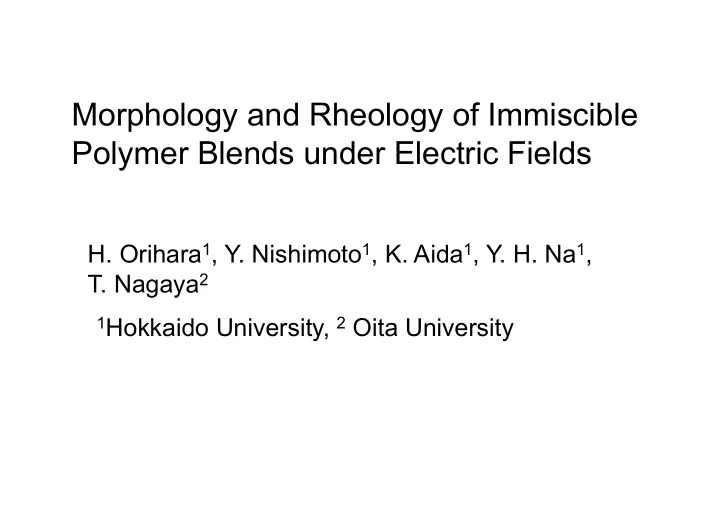

Morphology and Rheology of Immiscible Polymer Blends under Electric Fields H. Orihara 1 , Y. Nishimoto 1 , K. Aida 1 , Y. H. Na 1 , T. Nagaya 2 1 Hokkaido University, 2 Oita University
Immiscible polymer blends Rheology Morphology Close relationship Doi and Ohta, 1991 Constitutive equations Interface tensor Interface area density Excess stress from Interfacial tension(Batchelor, Doi, Onuki) Experimental tests (Takahashi et al.)
Effect of electric fields Immiscible polymer blend electro-rheological (ER) fluid ( Inoue et al. 1995 ) LCP OIL CH CH 3 3 PDMS SiO CH SiO CH 3 3 + CH (CH ) m 3 2 3 PIB n OCH CH O COO CN 2 2 MPS m/(m+n) = 0.2, m+n =50 ER effect is due to morphological change. Tajiri, K., K. Ohta, T. Nagaya, H. Orihara, Y. Ishibashi, M. Doi and M. Inoue, J. Rheol. 41 , 335-341 (1997). Kimura, H., K. Aikawa, Y. Masubuchi, J. Takimoto, K. Koyama and K. Minagawa, Rheol. Acta 37 54-60 (1998). 3D observations!
System combining CLSM and rheometer MCR301, Anton Paar CSU22, YOKOGAWA
Outline Subjected to a step electric field without shear flow 1. Coalescence of droplets 2. Shear modulus of columnar structure Subjected to a step electric field with shear flow 3. Interface tensor 4. Separation of viscous, interfacial and electric stresses 5. Relationship between excess stress and interface tensor
Experiment Shear flow Rheometer Focal plane z Electric field y x Piezo-actuator 5Hz Glass Plate Frame rate 500 f/s with ITO Sample 400x390x50 pixels Objective Lens 163x163x56 µ m 3 CSLM Gap: 200mm, Diameter: 35 mm Blend of LCP and PIB(Polyisobutylene)
Coalescence of droplets and column formation without shear flow
Blend: LCP(65 Pa s)/PIB(7.8 Pa s) at 25 ℃ Preshear of 200 s -1 for 20 min Application of ac electric field (512 Hz) without shear flow LCP:PIB=1:6 ( φ =0.14) E 113mm Coalescence 0 s 20 s 35 s 100 s 168mm (a) 2 kV amp /mm Elongation 0 s 20 s 35 s 100 s (b) 4 kV amp /mm
Movies (8 times as fast) 2 kV amp /mm 5 kV amp /mm
3D spatial correlation function Spheroid Average lenghts of semi-axes
Scaling property Assuming that all the droplets keep spherical shape, Scaling property holds ? Yes ? No !
Growth kinetics on the basis of hierarchical model E t =0 Viscous friction Dipole-dipole interaction Exponential growth
Volume fraction dependence
5/3
Sphere Spheroid t Deformation (Torza et al, 1971)
Numerical calculation
Storage Shear Modulus of Columnar Structure 75 µ m E 200 µ m 100 sec later after applying an ac electric field with an amplitude of 5kV/mm and a frequency of 2Hz.
Emergence of elasticity LCP:DMS=1:6 Oscillatory measurement f =2 Hz
Dependence of G’ on electric field strength
Electric stress on slant column Interfacial stress Electric stress
Interfacial tension E dependence f dependence
Transient process subjected to a step electric field with shear flow
Transient shear stress Blend with the same viscosity LCP:PIB=1:6 ( η =33.5 Pa s at 28 ℃ ) E amp =6 kV/mm (1000Hz) E on
3D images in the transient process y E 163 µ m z 56 µ m 0 s 163 µ m 1 s Flow x 2 s 3 s 4 s
Movie in the transient process y E 163 µ m z 56 µ m 163 µ m x Flow Real time speed
Interface tensor Symmetrical and traceless Sphere Ellipsoid Slant ellipsoid
Time evolution of interface tensor diagonal spheroid
Off-diagonal elements -q zx shear stress close relation
Mapping from structure to ellipsoid Ellipsoid Structure
c a b
z E y Real time speed x Flow
(Batchelor 1970, Doi 1987, Onuki 1987) Maxwell stress tensor
c ?
Electric stress Shear flow Electric torque on ellipsoid Electric stress (Halsey et al., 1992)
approximation 240 Pa
200 Pa (theory 240 Pa)
Relaxation process to droplets after removing E From columnar structure E off E on
Real time speed
From network structure E off E on
Real time speed
Removal of both electric field and shear flow From columnar structure E on
Real time speed
From network structure E on
Real time speed
Summary Subjected to a step electric field without shear flow 1. Coalescence of droplets in electric filed Hierarchical model is applicable Exponential growth Non-exponential growth Spheroid Sphere 2. Shear modulus of columnar structure Emergence of elasticity under electric fields Dependences of field strength and frequency
Subjected to a step electric field under shear flow 3. 3D images 4. Separation of viscous, interfacial and electric stresses 5. Interface tensor
Future subject Structure Can Doi-Ohta theory describe the change from droplet-dispersed structure to network one? Topology changes!
Different viscosities (Batchelor, 1970)
Calculation of interface tensor
Recommend
More recommend